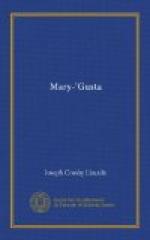CHAPTER XIII
The day after New Year’s Mary went back to Boston and to school. The long winter term—the term which Madeline Talbott, whose father was a judge, called “the extreme penalty”—began. Boston’s famous east winds, so welcome in summer and so raw and penetrating in winter, brought their usual allowance of snow and sleet, and the walks from Pinckney Street to the school and back were not always pleasant. Mrs. Wyeth had a slight attack of tonsillitis and Miss Pease a bronchial cold, but they united in declaring these afflictions due entirely to their own imprudence and not in the least to the climate, which, being like themselves, thoroughly Bostonian, was expected to maintain a proper degree of chill.
Mary, fortunately, escaped colds and illness. The walks in all sorts of weather did her good and her rosy cheeks and clear eyes were competent witnesses to her state of health. She was getting on well with her studies, and the Misses Cabot, not too easy to please, were apparently pleased with her. At home—for she had come to consider Mrs. Wyeth’s comfortable house a home, although not of course to be compared with the real home at South Harniss—at Mrs. Wyeth’s she was more of a favorite than ever, not only with the mistress of the house, but with Miss Pease, who was considered eccentric and whose liking was reported hard to win. The two ladies had many talks concerning the girl.
“She is remarkable,” declared Miss Pease on one occasion. “Considering her lack of early advantages, I consider her ease of manner and self-possession remarkable. She is a prodigy.”
Mrs. Wyeth sniffed. She enjoyed hearing Mary praised, but she objected to her friend’s choice of words.
“For mercy sake, Letitia,” she said, “don’t call her that. The word ‘prodigy’ always reminds me of the Crummles infant, the one with the green parasol and the white—er—lingerie, in ‘Nicholas Nickleby.’”
Miss Pease smiled with the superiority of the corrected who is about to correct.
“I don’t see why that should bring the individual you mention to mind,” she said. “If I remember correctly—and I was brought up on Dickens—she was a ‘phenomenon,’ not a prodigy. However, it makes no material difference what you and I call Mary Lathrop, the fact remains that she is an exceptionally well-behaved, good-mannered, polite—”
“Sweet, healthy girl,” interrupted Mrs. Wyeth, finishing the sentence. “I know that as well as you do, Letitia Pease. And you know I know it. Now, what have you in your mind concerning Mary? I know there is something, because you have been hinting at it for more than a week. What is it?”
Miss Pease looked wise.
“Oh, I have a plan,” she said. “I can’t tell even you, Emily, just what it is as yet. You see, it isn’t really a plan, but only an idea so far. She doesn’t know it herself, of course.”




